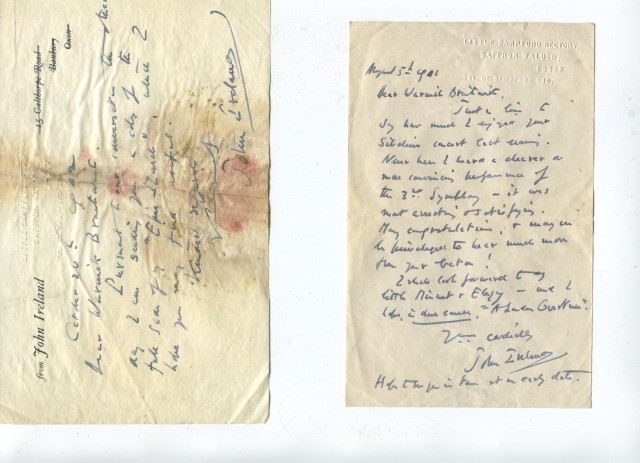
Two letters survive from Ireland to Warwick Braithwaite. Who was he, and what was his connection with the composer?
Braithwaite (1896–1971) , seen left, was a New Zealand-born orchestral conductor who spent most of his life working in Britain. After studying at the RAM, he became known especially for his work with the Royal Scottish National Orchestra and with Welsh National Opera.
I am indebted to Braithwaite’s son Nicholas, also a conductor and now living in South Australia, for kindly sharing with me the two hitherto unseen pieces of correspondence in Ireland’s hand. In the shorter letter left below, the composer is sending Epic March to Braithwaite. In the longer one he expresses his enthusiasm for Braithwaite’s conducting of Sibelius.
We know that Braithwaite did conduct Epic March, thanks to the research of Roger Flury, who shared with me these performances of Ireland’s music, all conducted by Warwick Braithwaite. Perhaps the most interesting is the last – a mini festival of the composer in New Zealand in 1954.
- 31 October 1942/Sheffield: Oval Hall, City Hall/Piano Concerto with Curzon and the Hallé Orchestra
- 30 January 1943/Glasgow/Piano Concerto with Curzon and the Scottish Orchestra (now the RSNO)
- 28 January 1945/Glasgow: Green’s Playhouse/Epic March with the Scottish Orchestra
- July 1954/Christchurch (New Zealand)/organised by the Music Department of Canterbury University College/John Ireland Festival: Satyricon/Piano Concerto/Mai-Dun/Ernest Jenner (piano); National Orchestra of New Zealand
 In 1941, following a period of intensive bombing and destruction of London, this insightful and enticing view emerged of Ireland ‘that there are in his music profound qualities of beauty and thought which become the more apparent in times of stress and unsettledness. It is to such music that we turn when our souls are troubled, and if only for that reason there are many admirers of this composer who hope it will not be too long before he provided them with another major composition’ (Tempo, August 1941, p. 9). Ireland had recently completed Sarnia and Three Pastels for piano, but no doubt to the delight of this writer was already working on
In 1941, following a period of intensive bombing and destruction of London, this insightful and enticing view emerged of Ireland ‘that there are in his music profound qualities of beauty and thought which become the more apparent in times of stress and unsettledness. It is to such music that we turn when our souls are troubled, and if only for that reason there are many admirers of this composer who hope it will not be too long before he provided them with another major composition’ (Tempo, August 1941, p. 9). Ireland had recently completed Sarnia and Three Pastels for piano, but no doubt to the delight of this writer was already working on